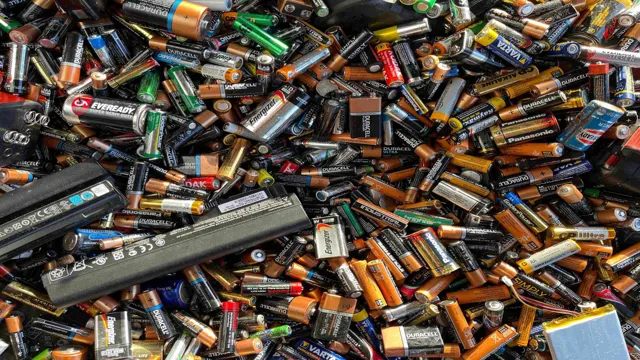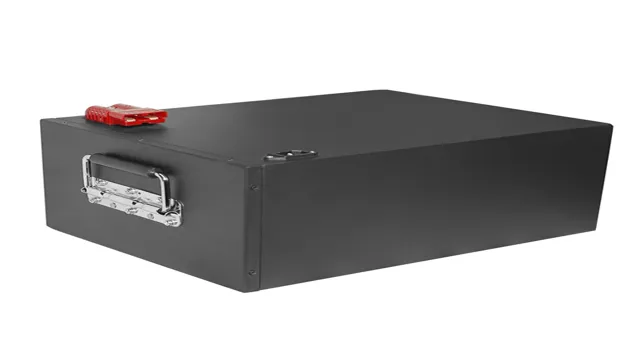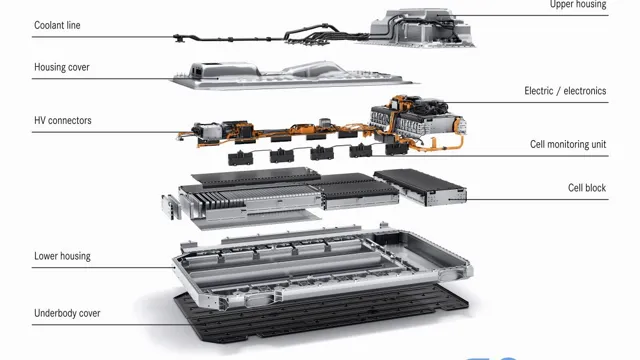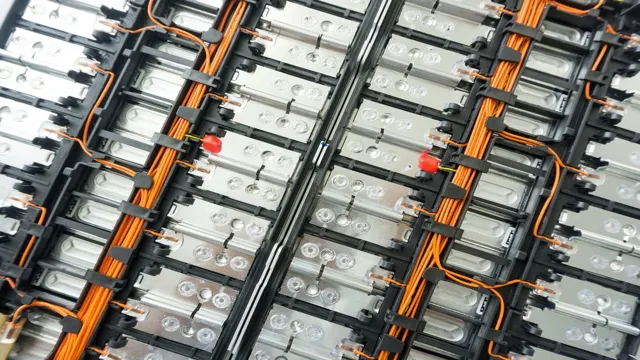Powering India’s Future: Top Companies Revolutionizing the Electric Car Batteries Industry
Electric cars are starting to take over the roads as a more eco-friendly and cost-effective way to commute. However, the biggest concern for electric car owners is the battery life and the availability of charging stations. In India, where public charging infrastructure is still in its nascent stage, the range of electric cars is limited.
The performance of Electric Car Batteries in India is a matter of utmost importance to its potential buyers. In this blog, we will be discussing electric car batteries in India and their importance, types of batteries used in electric cars, top electric cars available in India, and the future of electric car batteries in India. With this knowledge, potential buyers can make informed choices to purchase an electric car that best suits their needs and budget.
Top Companies
India is quickly emerging as a significant player in the electric vehicle (EV) industry, and several companies are making electric car batteries to fulfill this demand. One such company is Tata Chemicals, which is producing lithium-ion battery cells at a manufacturing plant in Gujarat. Another player is Exide Industries, which has partnered up with Swiss battery manufacturer Leclanché to produce lithium-ion batteries for EVs.
Other leading companies are Amara Raja Batteries, HBL Power Systems, and Okaya Power. These companies are pushing for the development and production of high-quality, efficient, and affordable electric car batteries in India. With the Indian government’s push towards electric mobility and the increasing demand for EVs, these companies are well-positioned to capitalize on the growing Indian EV market.
Overall, these companies are helping to boost India’s efforts to adopt and produce eco-friendly modes of transport.
Tata Chemicals
Tata Chemicals is a global company that operates in the chemicals, consumer products, and agriculture industries. The company is committed to sustainable and inclusive growth, and their products and services reflect this. Their chemicals division produces soda ash, salt, and speciality chemicals for various industries.
In consumer products, the company’s focus is on food and wellness products, with brands like Tata Salt and Tata Sampann. In agriculture, they offer crop nutrition solutions and work towards sustainable farming practices. What sets Tata Chemicals apart is their dedication to sustainability, and their efforts towards reducing their carbon footprint and promoting responsible sourcing.
They also prioritize innovation, investing in research and development to find new solutions and products that benefit their customers and the planet at large. Overall, Tata Chemicals is a company that is leading the way in promoting sustainability and ethical business practices while providing high-quality products and services.
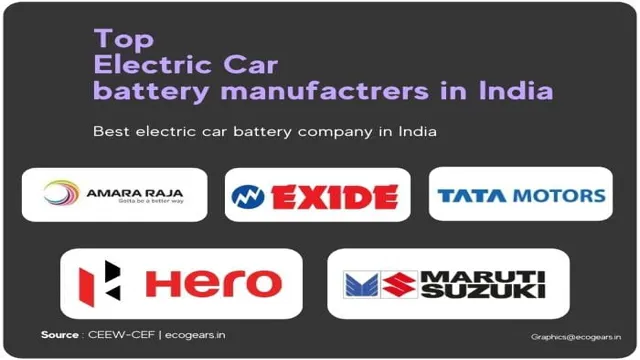
Exide Industries
Exide Industries is one of the leading companies in the Indian battery manufacturing industry. With over seven decades of experience, the company has established itself as a trustworthy and reliable brand that specializes in producing batteries for various applications. Exide’s range of products includes automotive batteries, industrial batteries, and home UPS systems.
The company has also expanded its reach by tapping into the solar energy market, offering solutions such as solar panels, inverters, and charge controllers. One of the key factors that make Exide a preferred choice among consumers is its focus on quality control and innovation. The company invests significantly in research and development to come up with new and advanced battery technologies that meet the changing needs of customers.
Additionally, the company’s extensive network of service centers and dealers ensures that customers can easily access high-quality products and after-sales support. Overall, Exide Industries is a company that prioritizes customer satisfaction and reliable performance, making it a top player in the battery manufacturing market.
Amara Raja Batteries
Amara Raja Batteries is one of the top companies in the battery industry, known for its exceptional quality and innovation. The company has a state-of-the-art manufacturing facility with advanced technologies that produce high-performance batteries. Amara Raja Batteries offers a wide range of batteries for various applications, including automotive, industrial, and home use.
Their products are designed to operate efficiently and withstand harsh conditions, making them ideal for use in demanding environments. What sets Amara Raja Batteries apart from its competitors is its focus on research and development. The company invests heavily in R&D to develop innovative solutions that meet the evolving needs of its customers.
Moreover, Amara Raja Batteries has a robust distribution network that ensures that their products are readily available to customers across India and other parts of the world. Overall, Amara Raja Batteries’ commitment to quality, innovation, and customer satisfaction makes it one of the top players in the battery industry.
Market Growth
In India, the electric vehicle market is on the verge of booming, and numerous domestic and international companies are investing in the manufacturing of electric cars and their batteries. When it comes to companies that make electric car batteries in India, Tata Chemicals and Exide Industries are the two major players who have set up their production facilities for lithium-ion batteries. They are supplying batteries to both automobile manufacturers and end-users and are trying to cater to the rising demand for electric vehicles.
Along with them, globally-renowned companies like Suzuki Motor and Toshiba Corporation have also announced their partnership for the production of lithium-ion batteries for electric vehicles in India. The Indian government is also promoting the electric vehicle market by providing subsidies, tax benefits, and other incentives to the people who buy electric vehicles. With rapidly growing interest and support for electric vehicles in India, it is anticipated that companies that make electric car batteries will experience significant growth in the coming years.
Rise of Electric Vehicles in India
The electric vehicle market in India is rapidly growing thanks to increased demand for eco-friendly and cost-effective forms of transportation. In 2020, approximately 156,000 electric vehicles were sold, marking a significant increase from the previous years. Government initiatives including subsidies and incentives for electric vehicle buyers, as well as a push towards renewable energy sources, have contributed to the surge in electric vehicle adoption.
Additionally, major automobile manufacturers such as Tata Motors and Mahindra & Mahindra are investing heavily in the production of electric cars, making them more accessible and affordable for consumers. With rising concerns over the impact of air pollution on public health, it’s clear that the electric vehicle market in India will continue to grow in the coming years. This shift towards sustainable transportation not only benefits our environment but also creates new employment opportunities and helps reduce our dependence on fossil fuels.
Government Initiatives and Policies
In recent years, the government has implemented a number of initiatives and policies to foster market growth. One such initiative is the “Make in India” campaign, which aims to encourage domestic and foreign companies to manufacture their products within the country. This has led to an increased focus on developing local infrastructure, attracting foreign investment, and creating job opportunities for Indian citizens.
Another key policy that has been implemented is the Goods and Services Tax (GST), which aims to simplify the tax system and promote transparency in business transactions. The GST has had a significant impact on the economy, leading to increased tax compliance and a reduction in the overall tax burden for businesses. Overall, these government initiatives and policies are playing a crucial role in driving market growth and improving the overall economic climate in India.
As a result, businesses of all sizes are starting to see increased opportunities for growth and expansion, making it an exciting time to be a part of the Indian economy.
Increasing Demand for EVs in India
As the world continues to shift towards a more sustainable future, the demand for electric vehicles (EVs) in India has been on the rise. With government incentives, increased awareness about climate change and a decrease in battery costs, the EV market is well-poised for growth. In addition, the Indian government has set an ambitious target of having 30% of all vehicles sold in the country be electric by 2030.
This has led to the introduction of more EV models by both international and domestic automakers, including companies such as Tata Motors and Mahindra. As more charging stations are built across the country, potential consumers are being encouraged to switch to EVs. The market growth is expected to be significant and will undoubtedly provide a boost to the country’s economy.
While there are still certain challenges that need to be addressed, such as the high cost of EVs and a lack of charging infrastructure in some parts of the country, the trend towards more sustainable transportation options is expected to continue.
Future Prospects
In the electrified future of transportation, electric cars are leading the way, both in terms of efficiency and sustainability. A significant factor in the success and viability of electric cars lies in the lithium-ion batteries that power them. In India, companies manufacturing electric car batteries are on the rise, with notable players like Tata Chemicals and Exide Industries leading the pack.
The Indian government’s push towards sustainable transportation has given a significant boost to the country’s electric car battery manufacturing sector, and the industry is expected to grow exponentially in the coming years. With increasing demand for electric cars, the future looks bright for companies that make electric car batteries in India, not just in terms of domestic sales but also as a leading exporter of lithium-ion batteries across the globe. The trend towards adopting electric vehicles is proving to be a global phenomenon, and India is well-positioned to capitalize on this shift in transportation technology.
Investments in R&D
Investments in R&D can bring about tremendous benefits in terms of innovation, competitiveness, and growth. Companies that invest in R&D are more likely to develop new products and services that generate high returns and increase market share. Moreover, these companies have a better understanding of the market and consumer trends, which allows them to adapt to changing circumstances and stay ahead of the competition.
However, investing in R&D is not a guarantee of success and requires a long-term perspective, patience, and flexibility. Companies that are too focused on short-term profits may not be willing to take the risks and make the necessary investments to succeed in the long run. Therefore, it is essential to strike a balance between short-term and long-term goals and allocate resources accordingly.
In conclusion, investments in R&D are critical for companies’ future prospects and should be a top priority for those seeking sustainable growth and innovation.
Collaborations and Partnerships
As we move forward, collaborations and partnerships are critical to the success of any business or industry. Working together with others can bring about innovative solutions and ideas that one company alone may not have been able to achieve. In today’s fast-paced world, it’s more critical than ever to have partners who can help us grow and thrive.
We can look to companies that share our values and goals, but may operate in different sectors or regions. By partnering with them, we can achieve greater reach and impact, and develop new markets and opportunities for growth. Strong relationships with partners and collaborators can also lead to increased trust and confidence in our products or services.
The path ahead may be challenging, but with the right collaborations and partnerships, we can overcome any obstacle.
Conclusion
In conclusion, it’s clear that India has made significant strides in promoting sustainable transportation by investing in companies that make electric car batteries. These companies are not only creating jobs and boosting the economy, but they’re also helping to reduce carbon emissions and address the global climate crisis. With the right support and innovation, the future of electric vehicles looks bright in India, proving that renewable energy can be a win-win for both business and the environment.
So, let’s get charged up and drive towards a greener tomorrow!”
FAQs
What are some companies in India that manufacture batteries for electric cars?
Some companies that manufacture batteries for electric cars in India include Amara Raja Batteries, Exide Industries, and Tata AutoComp.
How has the demand for electric car batteries impacted the Indian market?
The demand for electric car batteries has led to the growth of the Indian electric vehicle industry and has attracted investments from both domestic and international companies.
What are some factors that have contributed to the growth of the electric car battery industry in India?
Factors such as government subsidies, increasing concerns over air pollution and rising fuel prices, and technological advancements have contributed to the growth of the electric car battery industry in India.
Are there any challenges facing the electric car battery industry in India?
Yes, some challenges facing the electric car battery industry in India include high production costs, lack of adequate charging infrastructure, and competition from foreign companies.

